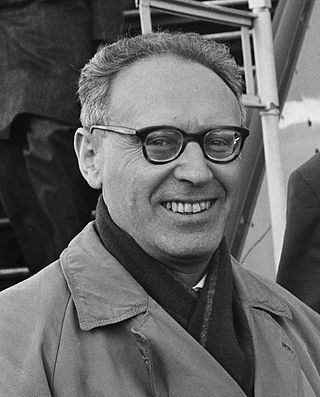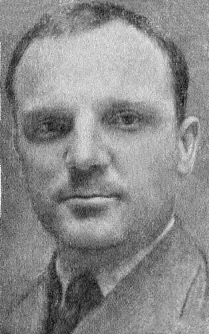
David Ionovich Bronstein was a Soviet chess player. Awarded the title of International Grandmaster by FIDE in 1950, he narrowly missed becoming World Chess Champion in 1951. Bronstein was one of the world's strongest players from the mid-1940s into the mid-1970s, and was described by his peers as a creative genius and master of tactics. He was also a renowned chess writer; his book Zurich International Chess Tournament 1953 is widely considered one of the greatest chess books ever written.

Mikhail Moiseyevich Botvinnik was a Soviet and Russian chess grandmaster who held five world titles in three different reigns. The sixth World Chess Champion, he also worked as an electrical engineer and computer scientist and was a pioneer in computer chess. He also had a mathematics degree (honorary).

Vasily Vasilyevich Smyslov was a Soviet and Russian chess grandmaster who was the seventh World Chess Champion from 1957 to 1958. He was a Candidate for the World Chess Championship on eight occasions. Smyslov twice tied for first place at the USSR Chess Championships, and his total of 17 Chess Olympiad medals won is an all-time record. In five European Team Championships, Smyslov won ten gold medals.

Paul Keres was an Estonian chess grandmaster and chess writer. He was among the world's top players from the mid-1930s to the mid-1960s, and narrowly missed a chance at a World Chess Championship match on five occasions. As Estonia was repeatedly invaded and occupied during World War II, Keres was forced by the circumstances to represent the Soviet Union and Nazi Germany (1941–44) in international tournaments.

Alexander Alexandrovich Kotov (Алекса́ндр Алекса́ндрович Ко́тов; was a Soviet chess grandmaster and author. He was a Soviet chess champion, a two-time world title Candidate, and a prolific writer on the subject of chess. Kotov served in high posts in the Soviet Chess Federation, and wrote most of his books during the Cold War. The importance and breadth of Kotov's work rank him among the all-time greats in this field.

Salomon Mikhailovich Flohr was a Czechoslovak and Soviet chess player and writer. He was among the first recipients of the title International Grandmaster from FIDE in 1950. Flohr dominated many tournaments of the pre-World War II years, and by the late 1930s was considered a contender for the World Championship. However, his patient, positional style was overtaken by the sharper, more tactical methods of the younger Soviet echelon after World War II.

Igor Zakharovich Bondarevsky was a Soviet Russian chess player, trainer, and chess author. He held the title of Grandmaster in both over-the-board and correspondence chess. Bondarevsky shared the 1940 Soviet title, and later coached World Champion Boris Spassky.

Alexander Markovich Konstantinopolsky was a Soviet chess player, trainer and writer. He was a five-time champion of Kiev, and trained the world title challenger David Bronstein from a young age. He was awarded the title of International Master (IM) by FIDE in 1950, won the first Soviet Correspondence Chess Championship in 1951, earned the IM title at correspondence in 1966, and earned the title of Honorary Grandmaster in 1983.

Ilya Leontievich Rabinovich was a Russian and later Soviet chess player, among the best in his country for three decades, from 1910 to 1940. His best result was a shared first place in the 9th Soviet Championship of 1934-35. He was also a chess writer.

Vladimir Andreevich Makogonov was a Soviet chess player from Azerbaijan SSR. He was born in Nakhchivan but lived in Baku for most of his life. He became an International Master in 1950 and was awarded an honorary Grandmaster title in 1987.
Lev Solomonovich Aronin was a Soviet International Master of chess. He was a meteorologist by profession.
Vladimir Alexeyevich Alatortsev was a Soviet chess player, author, and administrator. During his career, he became champion of both Leningrad and Moscow, and played in the Soviet Chess Championship finals nine times, with his best competitive results in the 1930s. He placed clear second in the 1933 Soviet final. He retired from most competitive play in the early 1950s, moving into roles as a chess organizer, teacher, and coach. He served as chairman of the All-Union chess section from 1954 to 1959 and as chairman of the USSR Chess Federation from 1959 to 1961. By profession, he was a hydraulics engineer.

Groningen 1946 was the first major international chess tournament to be held after World War II. Held at Groningen in August and September 1946, it was considered a miracle that the Netherlands could stage such an event just fifteen months after the end of the war.

Georgy Mikhailovich Lisitsin or Lisitsyn was a Russian chess master from Leningrad. After high school he entered the Leningrad Industrial Institute, from which he graduated as a mechanical engineer.

Semyon Abramovich Furman was a Soviet chess player and trainer of Belarusian Jewish origin. He was awarded the title of Grandmaster by FIDE in 1966. Furman is best known for developing Anatoly Karpov into a World Chess Champion, but was a formidable player himself, as well as a successful coach for several other world-class players. His name is sometimes written as Semen or Semion Furman.

The 1933 USSR Chess Championship was the 8th edition of USSR Chess Championship. Held from 16 August to 9 September in Leningrad. The tournament was won by Mikhail Botvinnik.

The 1934/1935 USSR Chess Championship was the 9th edition of USSR Chess Championship. Held from 7 December 1934 to 2 January 1935 in Leningrad. The tournament was won by Grigory Levenfish and Ilya Rabinovich. Mikhail Botvinnik did not participate because on the same date he was abroad playing the Hastings Tournament.

The 1940 Soviet Chess Championship was the 12th edition of USSR Chess Championship. Held from 5 September to 3 October 1940 in Moscow. The tournament was won by Andor Lilienthal and Igor Bondarevsky. Twenty of the Soviet Union's strongest masters competed in the final, six of whom qualified in the semifinals in Kiev earlier that year: Eduard Gerstenfeld, Mark Stolberg, Igor Bondarevsky, Iosif Rudakovsky, Alexander Konstantinopolsky and Peter Dubinin. The remaining invitations went to the Soviet chess elite. Botvinnik did his worst championship, only drawing in 5th/6th position, losing matches to both winners. This championship marked the debut of Paul Keres (4th) and the future world champion Vassily Smyslov (3rd). USSR had expanded its territory in 1939-40, incorporating the Baltic states, which meant that the strong masters Paul Keres from Estonia and Vladimir Petrov from Latvia were able to participate. In 1941, the top six played a competition called Absolute Championship of Soviet Union, ending with Botvinnik's victory.

The 1948 Soviet Chess Championship was the 16th edition of USSR Chess Championship. Held from 10 November to 13 December 1948 in Moscow. The tournament was won by David Bronstein and Alexander Kotov. Mikhail Botvinnik did not participate in the championship again, as he had recently won the world title in the tournament at The Hague and Moscow. In fact he was to take a three-year break, to work on his doctorate. Quarterfinal tournaments were played in the cities of Tbilisi and Yaroslavl; and semifinals in Sverdlovsk, Leningrad and Moscow.

The 1952 Soviet Chess Championship was the 20th edition of the USSR Chess Championship. Held from 29 November to 29 December 1952 in Moscow. The tournament was won by Mikhail Botvinnik. Botvinnik and Mark Taimanov had a play-off match of six games in February 1953, which ended with the victory of Botvinnik 3½-2½, so bringing him his seventh title. The final were preceded by quarter-finals events and four semifinals. For the first time in such events players were forbidden to agree a draw in under 30 moves unless they could get the arbiter's consent.



















